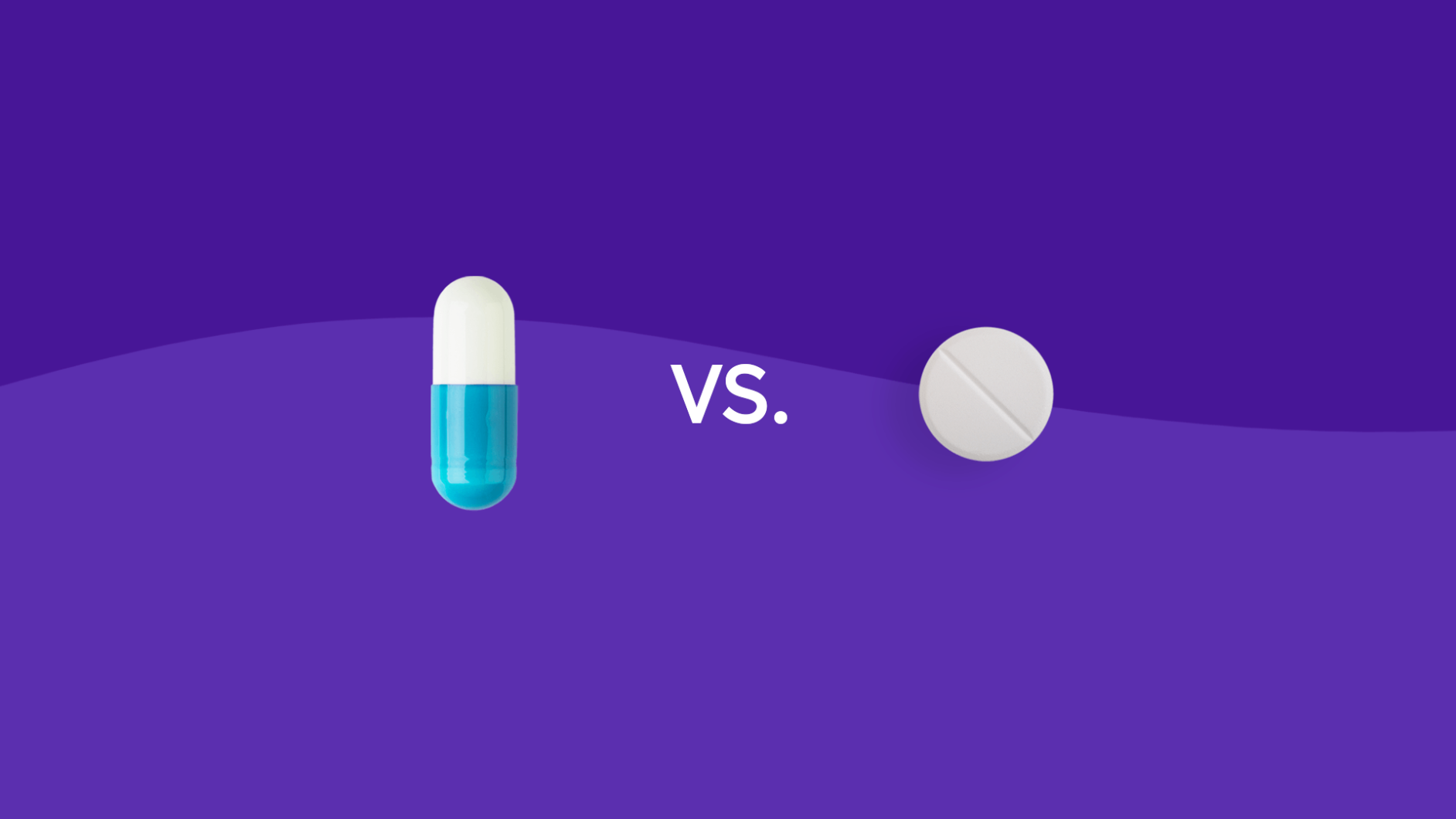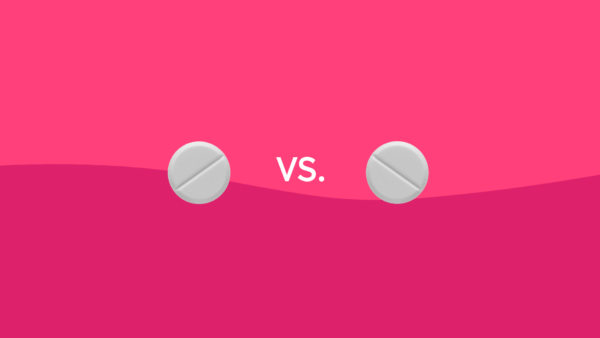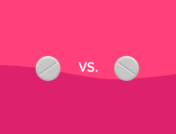Drug overview & main differences | Conditions treated | Efficacy | Insurance coverage and cost comparison | Side effects | Drug interactions | Warnings | FAQ
Effexor (venlafaxine) and Wellbutrin (bupropion) are two different antidepressant medications that can be used to treat depression. Both Effexor and Wellbutrin work by boosting specific neurotransmitters, such as norepinephrine and dopamine, in the brain. Balancing these neurotransmitters can help improve mood, promote better sleep, and boost your appetite and focus. Antidepressants are also useful for treating other mental health problems in addition to major depression.
Despite their similarities, Effexor and Wellbutrin work differently and are FDA approved to treat different conditions.
What are the main differences between Effexor and Wellbutrin?
Effexor is the brand name for venlafaxine. It is chemically identical to Pristiq (desvenlafaxine) and belongs to a drug class called serotonin-norepinephrine reuptake inhibitors (SNRIs). Effexor works by blocking the reabsorption of serotonin, norepinephrine, and dopamine in the brain. Blocking their reabsorption, or reuptake, increases their availability and overall effects.
Brand-name Effexor in immediate-release tablets has been discontinued. Instead, an extended-release form called Effexor XR is prescribed. Effexor XR comes in strengths of 37.5 mg, 75 mg, and 150 mg.
Wellbutrin is the brand name for bupropion. It is a unique antidepressant classified as an aminoketone. Wellbutrin is believed to work by blocking the reuptake of norepinephrine and dopamine neurotransmitters to boost their effects. Unlike Effexor, Wellbutrin does not alter serotonin levels as much.
Wellbutrin comes in immediate-release oral tablets with strengths of 75 mg or 100 mg. However, it is usually prescribed as a sustained-release tablet (Wellbutrin SR) or an extended-release tablet (Wellbutrin XL). Wellbutrin SR and Wellbutrin XL are released gradually in the body and can be taken once per day.
| Main differences between Effexor and Wellbutrin | ||
|---|---|---|
| Effexor | Wellbutrin | |
| Drug class | Serotonin-norepinephrine reuptake inhibitors (SNRIs) | Aminoketone |
| Brand/generic status | Brand and generic version available | Brand and generic version available |
| What is the generic name? | Venlafaxine | Bupropion |
| What form(s) does the drug come in? | Oral tablet | Oral tablet |
| What is the standard dosage? | Initially, 75 mg per day. Dosage may be increased by 75 mg per day every 4 days. Dosage should not exceed a maximum of 225 mg per day in divided doses. | Initially, 100 mg twice daily. After 3 days, dosage may be increased to 100 mg 3 times daily. Dosage should not exceed a single dose of 150 mg at a time. |
| How long is the typical treatment? | Long-term treatment | Long-term treatment |
| Who typically uses the medication? | Adults 18 years and older | Adults 18 years and older |
Conditions treated by Effexor and Wellbutrin
Effexor is labeled to treat major depression or major depressive disorder. It can also treat anxiety disorders, among other mental health conditions. Immediate-release venlafaxine can help treat panic attacks while the extended-release form is approved to treat generalized anxiety disorder. Off-label uses of Effexor include treatment of obsessive-compulsive disorder (OCD) and premenstrual dysphoric disorder (PMDD).
Wellbutrin is FDA approved to treat major depressive disorder and seasonal affective disorder. It is also sometimes used as an off-label drug to treat bipolar disorder, attention deficit hyperactivity disorder (ADHD), and sexual dysfunction caused by SSRI antidepressants.
| Condition | Effexor | Wellbutrin |
| Major depressive disorder | Yes | Yes |
| Generalized anxiety disorder | Yes | No |
| Panic disorder | Yes | No |
| Obsessive-compulsive disorder | Off-label | No |
| Premenstrual dysphoric disorder | Off-label | No |
| Bipolar disorder | Off-label | Off-label |
| Attention deficit hyperactivity disorder (ADHD) | Off-label | Off-label |
| Seasonal affective disorder | Off-label | Yes |
Is Effexor or Wellbutrin more effective?
Effexor and Wellbutrin are effective medications for treating depression symptoms. However, the more effective antidepressant is the one that works best for you.
According to a meta-analysis, Effexor and Wellbutrin are similarly effective for treating adults with major depressive disorder. Although they both work similarly, Wellbutrin has been shown to produce less sexual dysfunction as a side effect. Sexual dysfunction is a common side effect of antidepressants, especially selective serotonin reuptake inhibitors (SSRIs).
Wellbutrin and Effexor have also been compared to SSRI antidepressants like sertraline, escitalopram, fluoxetine, paroxetine, and duloxetine. Clinical trials have shown that Wellbutrin is similar in effectiveness to SSRIs. Conversely, Effexor has been found to be more effective than SSRIs, although more people may stop taking Effexor because of side effects.
Consult your healthcare provider for the best treatment for you. After a complete evaluation of your overall symptoms, your doctor will work with you to find an appropriate medication.
Coverage and cost comparison of Effexor vs. Wellbutrin
Effexor XR requires a prescription. It is usually covered by most Medicare and insurance plans. For a 30-day supply of 75 mg tablets, the average retail cost is around $146. Using an Effexor XR SingleCare card can lower this price to $15 depending on the pharmacy you use.
Your doctor will likely prescribe Wellbutrin SR or Wellbutrin XL. These versions of Wellbutrin release the drug gradually in the body. Most Medicare and insurance plans will cover Wellbutrin XL or Wellbutrin SR. If you don’t have insurance, the average cash price of Wellbutrin can be more than $100. Even if you have insurance, you can use a Wellbutrin XL SingleCare card or a Wellbutrin SR SingleCare card to save money on your prescription.
| Effexor | Wellbutrin | |
| Typically covered by insurance? | Yes | Yes |
| Typically covered by Medicare Part D? | Yes | Yes |
| Standard dosage | Effexor XR: 75 mg tablets once daily (quantity of 30) | Wellbutrin SR/XL: 150 mg once daily (quantity of 30) |
| Typical Medicare copay | $0–$1 | $0–$22 |
| SingleCare cost | $15+ | $11+ |
Common side effects of Effexor vs. Wellbutrin
The most common side effects of Effexor are drowsiness, insomnia, dizziness, nervousness, nausea, and headache. Other common side effects include dry mouth, muscle weakness, sweating, and an increased heart rate (palpitations). Sexual side effects, including sexual dysfunction and abnormal ejaculation, are also common while using Effexor.
The most common side effects of Wellbutrin are insomnia, dizziness, dry mouth, nausea, headache, and sweating. Wellbutrin may also cause nervousness, muscle weakness, and palpitations, among other side effects.
Effexor and Wellbutrin can also cause changes in weight. Both antidepressants may cause either weight gain or weight loss depending on your response to the drug.
Serious side effects of Effexor and Wellbutrin include new or worsened mental health problems, suicidal thoughts, agitation, and hostility. Monitor any changes in mood while taking these medications. Consult your healthcare provider if you experience any severe side effects.
| Effexor | Wellbutrin | |||
| Side effect | Applicable? | Frequency | Applicable? | Frequency |
| Drowsiness | Yes | 3% | No | – |
| Insomnia | Yes | 3% | Yes | 19% |
| Dizziness | Yes | 3% | Yes | 22% |
| Nervousness | Yes | 2% | Yes | 3.1% |
| Dry mouth | Yes | 2% | Yes | 28% |
| Nausea | Yes | 6% | Yes | 23% |
| Headache | Yes | 3% | Yes | 26% |
| Muscle weakness | Yes | 2% | Yes | * |
| Palpitations | Yes | * | Yes | 4% |
| Sweating | Yes | 2% | Yes | 22% |
| Abnormal ejaculation | Yes | 3% | No | – |
*not reported
Frequency is not based on data from a head-to-head trial. This may not be a complete list of adverse effects that can occur. Please refer to your doctor or healthcare provider to learn more.
Source: FDA Label (Effexor), FDA Label (Wellbutrin)
Drug interactions of Effexor vs. Wellbutrin
Effexor and Wellbutrin can interact with monoamine oxidase inhibitors (MAOIs). Taking an MAOI, like isocarboxazid or phenelzine, with Effexor or Wellbutrin can increase the risk of serotonin syndrome. Effexor and Wellbutrin should not be taken with an MAOI or within 14 days of stopping an MAOI.
Effexor and Wellbutrin can interact with serotonergic drugs. For example, taking a serotonergic drug like nortriptyline, a tricyclic antidepressant, can increase the risk of serotonin syndrome when combined with another antidepressant. Effexor and Wellbutrin should also be avoided with St. John’s wort, an herbal drug frequently used for its antidepressant effects. Tell your doctor if you’re taking other antidepressants before starting Effexor or Wellbutrin.
Effexor and Wellbutrin can affect the functions of platelets and blood clotting. The use of Effexor or Wellbutrin could decrease the effectiveness of warfarin or other anticoagulants.
| Drug | Drug class | Effexor | Wellbutrin |
| Isocarboxazid Phenelzine Selegiline |
Monoamine oxidase inhibitors (MAOIs) | Yes | Yes |
| Lithium Nortriptyline St. John’s wort |
Serotonergic drugs | Yes | Yes |
| Warfarin | Anticoagulants | Yes | Yes |
Consult a healthcare professional for other possible drug interactions.
Warnings of Effexor and Wellbutrin
The use of Effexor or Wellbutrin can lead to an increased risk of suicidal thoughts, especially in adolescents and young adults. Behavioral and mood changes should be monitored when starting a medication like Effexor or Wellbutrin. If you experience severe behavioral changes, antidepressants may be discontinued or adjusted by your healthcare provider.
Effexor and Wellbutrin can increase blood pressure. Therefore, it’s important to monitor blood pressure while taking these medications. Consult your doctor if you have a history of high blood pressure before taking these medications.
Certain antidepressants like SSRIs and SNRIs can increase the risk of bleeding. Effexor should be avoided with anticoagulants and other drugs that affect blood clotting. Wellbutrin, which is not an SSRI or SNRI, is less likely to affect platelet functions.
When used with serotonergic drugs, Effexor and Wellbutrin can increase the risk of serotonin syndrome. Symptoms of serotonin syndrome include an increased heart rate, increased blood pressure, and fever. Consult your doctor if you experience any of these symptoms. Serotonin syndrome may require emergency medical attention.
Frequently asked questions about Effexor vs. Wellbutrin
What is Effexor?
Effexor is a brand-name medication used to treat major depressive disorder. The generic name of Effexor is venlafaxine. Effexor XR is the extended-release version of Effexor and can be taken once daily. Effexor can also treat anxiety and panic disorders.
What is Wellbutrin?
Wellbutrin is known by its generic name bupropion. It is primarily used to treat major depressive disorder. Wellbutrin is usually prescribed as Wellbutrin SR or Wellbutrin XL to treat depression and other mental health conditions. The extended-release form of Wellbutrin can be taken once daily.
Are Effexor and Wellbutrin the same?
Both Effexor and Wellbutrin can treat symptoms of depression. However, Effexor is a serotonin-norepinephrine reuptake inhibitor (SNRI) and Wellbutrin is an aminoketone. Therefore, these drugs work in different ways. They also have different FDA-approved uses.
Is Effexor or Wellbutrin better?
Effexor and Wellbutrin are both effective drugs that treat depression. Effexor is better than Wellbutrin for treating anxiety disorders that are experienced alongside depression. However, compared to Wellbutrin, Effexor may cause more sexual side effects, such as abnormal ejaculation and impotence.
Can I use Effexor or Wellbutrin while pregnant?
Effexor and Wellbutrin are in pregnancy class C and may increase the risk of birth defects. Both drugs are also secreted in breast milk. The use of Effexor and Wellbutrin should be cautioned or avoided during pregnancy.
Can I use Effexor or Wellbutrin with alcohol?
It is not recommended to drink alcohol while taking Effexor or Wellbutrin. Alcohol use with Effexor or Wellbutrin can lead to increased drowsiness, dizziness, and other side effects. Alcohol use can also increase the risk of seizures in people who take Wellbutrin.





